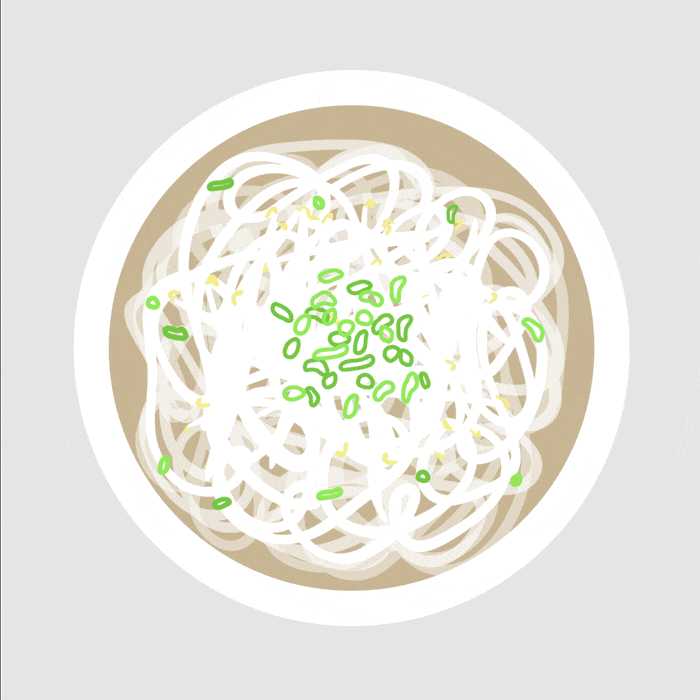Interview / Entrevue
POUR L’AMOUR DU PHO
Une conversation avec Julie Tran.
Par Viet Tran
Le vendredi, 11 septembre, 2020

Au cours de la semaine dernière, la communauté vietnamienne a vivement contesté la stratégie de marketing employée par le propriétaire du restaurant controversé Pho King Bon. Ce dernier a décidé d’utiliser des termes du jargon québécois et des jeux de mots sexuellement explicites pour nommer les différents plats vietnamiens figurant sur son menu.
Durant les jours qui ont suivi, les internautes ont pu être témoins des échanges entre le propriétaire du restaurant et la communauté virtuelle qui a condamné le manque de respect envers les personnes d’origine vietnamienne. Plusieurs captures d’écran ont circulé sur les médias sociaux, dans lesquelles on peut voir le propriétaire contester la validité des plaintes et se défendre d’avoir eu des intentions racistes derrière son plan de marketing. Parmi ses arguments, l’homme au coeur de la controverse a souligné qu’il avait consulté d’autres femmes, incluant une «amie féministe» pour rédiger son menu. Une pétition a vu le jour, demandant au restaurant de changer son menu et plus de 6 000 noms s’y sont ajoutés. Le lundi 7 septembre, des excuses officielles ont été présentées et des changements futurs au menu ont été annoncés. Malgré cela, les vives réactions relevant de cette affaire continuent d’affluer sur les médias sociaux et dans les médias traditionnels.
«Viet Kong», un jeu de mot faisant référence à «Việt Cộng»–un terme qui désigne les soldats qui se sont battus au nom du Front national de libération communiste du Vietnam et qui ont été en grande partie responsables du massacre des Vietnamiens du Sud–a été utilisé afin de nommer un cocktail composé, entre autres, de whisky japonais. Parmi d’autres jeux de mots vulgaires, on retrouve «Bun Thit Nuong», dont la prononciation était explicitement indiquée dans le menu comme «Bonne Tite Noune».
On pourrait facilement percevoir cette histoire comme un cas de mauvais goût banal résultant de la mondialisation, mais j’ai vraiment été inspiré par les efforts de mobilisation locale qui en ont découlé, étant donné que cela s’inscrit dans un plus grand mouvement qui dénonce le manque de considération de la part des restaurants d’inspiration asiatique pris en charge par des propriétaires blancs à Montréal tels que Montréal Plaza et Le Mousso qui ont tous deux fait les manchettes autour de la question de l'appropriation culturelle culinaire aux côtés du restaurant Pho King Bon, désormais rendu tristement célèbre.
En grandissant, mes parents ne m’ont jamais appris à dénoncer le racisme. Je croyais que c’était quelque chose qui devait être toléré, une circonstance «normale» à laquelle il fallait s’attendre sans pourtant y réagir. Ils avaient d’autres soucis à gérer – mon père se souvient de la première fois qu’il a mis les pieds en tant qu’adolescent sur cette terre froide et immaculée après avoir fui la Guerre du Vietnam, anticipant déjà les efforts d’adaptation qu’il devrait entreprendre. On disait souvent à beaucoup d'enfants de garder la tête baissée quand on était confronté à la discrimination et de ne pas déranger, mais les temps ont changé.
Afin d’échanger sur le sujet et de comprendre l’indignation vécue par la communauté vietnamienne durant cette controverse, j’ai décidé de rencontrer Julie Tran, une femme qui parle avec détermination lorsqu’elle adresse publiquement les problématiques qui touchent les personnes marginalisées. La féministe asiatique auto-proclamée a récemment été sélectionnée pour faire partie du «Programme de leadership au pluriel», un projet communautaire qui vise à former des leaders BIPOC. Munie d’un sourire rayonnant, elle cherche à amplifier la voix de la communauté asiatique dans les mouvements de militantisme social, de même que de se prononcer contre la violence sexuelle commise envers les femmes asiatiques.
Lors de notre conversation, nous avons adressé plusieurs sujets allant de l’appropriation culturelle jusqu’à la fétichisation sexuelle des femmes asiatiques. Nous savions tous les deux que ce genre de situation n’était pas nouveau. Cela faisait écho aux ching chongs et aux ling lings auxquels nous nous sommes tous heurtés en grandissant – un rappel tranchant des manières dont l’Occident humilie les cultures asiatiques et en fait la parodie pour son propre divertissement. Mais je crois que l’acuité de ses réponses témoigne de notre désir partagé de saisir cette opportunité pour passer un message.
Julie Tran
@yataimtl
01/ Yatai means shop stand in Japanese, a small mobile food stall typically selling ramen or other types of street food. What does the word yatai mean to you?
Yasuko: Yatai for me is a place where people can gather and enjoy eating, talking, and drinking. And also, yatai happens at night. People are tired, but when they see the light at the yatai, people are more relaxed and ready to have fun.
Thien: It’s a kind of comfortable place for the people. It’s an outdoor setting with an indoor feel. it’s a very intimate experience. It’s very different from YATAI MTL. In Japan, you enter a noren (Japanese curtain) and you have this chef cooking in front of you. The whole mood is very low-tech, cyberpunk. It’s like an outdoor izakaya for workers. We dream about building one yatai where we can share that kind of experience.
Thien: It’s a kind of comfortable place for the people. It’s an outdoor setting with an indoor feel. it’s a very intimate experience. It’s very different from YATAI MTL. In Japan, you enter a noren (Japanese curtain) and you have this chef cooking in front of you. The whole mood is very low-tech, cyberpunk. It’s like an outdoor izakaya for workers. We dream about building one yatai where we can share that kind of experience.
02/ When did the idea for this festival first come to your mind? |
T: The first spark of having yatai in Montreal is because of Fukuoka, a city we love. Fukuoka is very famous for its yatai because it’s a disappearing culture throughout Japan, unlike in Vietnam or Bangkok where street food is very prevalent. When we were in Fukuoka at a yatai around the river, we thought it would be nice to bring this kind of atmosphere in Montreal. That’s why we started YATAI MTL. The first thing we tried when we came back was a ramen rumble: we invited two ramen chefs at Marché des Possibles and created a Facebook event. The event exploded and hosted 1-2 thousand people per day! Gradually, we learned from that, and right now we keep improving each year.
03/ What do you think of the street food culture in Montreal?
|
T: It’s still very new, it's been only 5-6 years. Compared to New York or Toronto. In Montreal, they have been prohibiting street food for a very long time. Our friend, Guy-Vincent Melo, the president of the food trucks association in Montreal, has been fighting to legalize food trucks. So, we were very lucky to be able to organize YATAI MTL at Marché des Possibles, which has a permit to sell food.
04/ You’ve announced that this year’s event will be held partly online. How did Covid-19 affect the organization? What are some of the challenges you’ve faced? |
T: At the beginning of the pandemic, there’s no way we could organize anything. We knew it had to be done online. So we started Yatai à la maison with the idea of ordering takeout food and watching online content. Then, as the city slowly reopened, we learned that it was safe to dine outside as long as we followed the protocols. It has to be a balance between being safe and to keep living and having fun. So, we found a solution where you can follow an itinerary with all the participating restaurants, get takeout food and eat on the street like the real yatai experience, and watch cultural events online while you wait in line [laughing]. Unlike previous editions, YATAI MTL is taking over the city!
Y: And we invite people to wear a yukata (summer kimono) or a kimono, or the YATAI MTL shirt to create a Japanese ambiance throughout the town.
Y: And we invite people to wear a yukata (summer kimono) or a kimono, or the YATAI MTL shirt to create a Japanese ambiance throughout the town.
05/ Do you guys organize everything? |
T: It’s mostly the two of us. But we have some help with the logistics and communication.
Y: I think 80% is from Thien. 20% is from me.
T: See, that’s not true. It’s the Japanese modesty [laughing]. All artistic decisions are Yasuko. I am more in charge of logistics.
Y: I think 80% is from Thien. 20% is from me.
T: See, that’s not true. It’s the Japanese modesty [laughing]. All artistic decisions are Yasuko. I am more in charge of logistics.
06/ When do you guys start planning?
T: We are already planning for next year!
Y: But not really in action, just collecting some ideas.
Y: But not really in action, just collecting some ideas.
07/ It’s funny how you were saying that you complement each other. What’s your background story and how did your paths cross? |
T: I think I always had that balance. For many years I was a video artist. But I studied economics and management. When I was an artist, I did all the production and organization. But Yasuko is much stronger than me in terms of artistic direction.
Y: When I met Thien, he was a VJ at the club, I was just following him around and started to assist him.
Y: When I met Thien, he was a VJ at the club, I was just following him around and started to assist him.
08/ When did you move to Canada? |
T: I was born in Vietnam and I came here as a refugee when I was 6 years old, I have been living in Montreal ever since. My family fled from Vietnam because the country was very poor after the war and they saw no future for us there. They risked their lives to give us the hope of a better future.
Y: I came here almost 18 years ago. I was on a working holiday visa and I studied English. Then I met Thien and I started learning French.
Y: I came here almost 18 years ago. I was on a working holiday visa and I studied English. Then I met Thien and I started learning French.
“When I came to Canada, I started appreciating Japanese culture and traditions much more than I used to before.” — Yasuko








